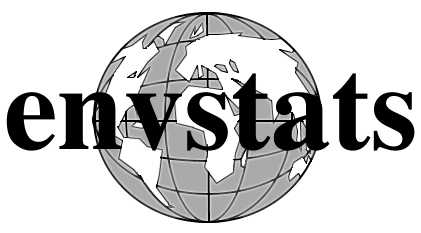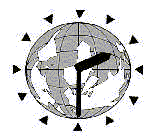
|
****JavaScript based drop down DHTML menu generated by NavStudio. (OpenCube Inc. - http://www.opencube.com)****
|
|
|
NEWS
from the Issue 9 August 2000 - December 2000
Integrated Environmental and Economic Accounting - An Operational Manual The United Nations Statistics Division (UNSD) and the United Nations Environment Programme (UNEP) issued Integrated Environmental and Economic Accounting - An Operational Manual1 in the handbook series of national accounting. The handbook is the result of collaboration in the so-called 'Nairobi Group', established by UNEP to advance international work on environmental and natural resources accounting. The Group included internationally recognized experts from developed and developing countries, international and non-governmental organizations. The 'Operational Manual', as it is commonly referred to, further develops the concepts and methods proposed in the original System of integrated Environmental and Economic Accounting (SEEA)2, using practical experience gained in SEEA case studies. The Manual provides hands-on guidance for the implementation of the more practical parts of the SEEA, namely those which can be compiled within reasonable time and cost constraints. Most of these parts could eventually be included in the recurrent data collection efforts of national statistical services. The Manual uses a step-by-step approach and a fictitious data set to illustrate how one should go about the compilation of the accounts. A sequence of tabulations or 'worksheets' is to facilitate the understanding of the concepts and definitions, the procedures of data collection and processing, and the coherence of the tabulations within the overall accounting system. The ten steps set out from a restructuring of conventional national accounts, describe the compilation of physical and monetary data for environmental stocks and flows, and present the resulting environmentally adjusted ('green') indicators (see textbox).
The introductory chapter of the Manual explains the main purpose of integrated accounting as assessing the interaction of environment and economy, with a view to investigating the sustainability of economic growth and development. Final chapters discuss the use of environmental accounts in economic and environmental policy analysis, and describe the institutional setup for case studies. Cooperation among the data producers and users is deemed essential for establishing an SEEA compilation. A user-friendly software4,
prepared by UNSD and the Fondazione ENI Enrico Mattei (FEEM) leads through
the sequence of worksheets which are linked by a set of automatic formulae
and consistency checks. The software allows the user to customize the
tabulations, identify errors in the computation and reveals the interrelationships
between data and tabulations. 1
Studies
in Methods Ser. F, No. 78 (Sales No. E.00.XVII.17), New York: United Nations.
Questionnaire
on Environment Indicators 2001
News
from the regional commissions Economic
Commission for Latin America and the Caribbean (ECLAC), Farid Isa In August 2000, the Statistics and Economic Projections Division of ECLAC conducted a second survey to assess the current situation on the state of environment statistics in the region. According to answers received from 18 countries, there are both public and private agencies producing environment statistics. However, further progress is needed for a real integration, coordination and dissemination of this information in a form that can be properly used by policy-makers and users in general. Within the Programme of International Statistical Work for Latin America and the Caribbean, which will be submitted for approval at the next Conference of Statistics of the Americas, two workshops are being planned for the biennium 2001-2002: one on environmental accounting, and the other on environmental statistics. The intention is to introduce the SEEA and UNSD's forthcoming Manual of Environmental Statistics. Additionally, with the cooperation of Instituto Nacional de Estadísticas (INE) of Chile and INEGI of Mexico, ECLAC is planning to establish a working group to develop an integrated environment statistical system for the region, in a way that the environment statistics produced by different institutions can be coordinated and organized by the national statistics offices (NSOs).

Staff news Maila Puolamaa is the new chief of the UNSD Environment Statistics Section. She studied Environmental Pollution and Occupational Safety at the University of Kuopio, Finland. She was the Head of the Environment Statistics Unit in Statistics Finland for five years. She specialized in various aspects of environment statistics (marine pollution, waste, waste water, air emissions, material flows), environmental indicators and indices as well as modeling of environmental pressures on the basis of economic statistics (agriculture, industry, energy, construction) in Statistics Finland, OECD, UNECE and in Eurostat. Katalin Gieri, statistician, retired from UNSD in November 2000. She has worked for many years at UNSD in various fields of statistics including Industry, Construction, Management and Planning and more recently in Environment Statistics. Kati is now pursuing her second master's degree, this time in social work, at New York University. She intends to work with youthful offenders. Emmanuel Opoku, from the University of Science and Technology, Kumasi, Ghana has, within the framework of the United Nations Internship Programme, assisted UNSD from September to November 2000 in its work on environmental statistics and indicators, in particular in relation to the UNSD/CARICOM project. About the authors Hussein Abaza received his B.A in Economics from the American University in Cairo (1973) and his M.Phil. in Urban Housing planning from the University of Bradford (1981). He joined the United Nations Environment Programme in 1982, presently the Chief of the Economics and Trade Unit since March 97. He also served as Coordinator of the African Ministerial Conference on the Environment (AMCEN) and Chief of the Environment and Economics Unit. Mohammed Al-Badrawy is a statistician in charge of environment, industry and energy statistics in the Statistics Division of ESCWA in Beirut. He holds a M.A. in Quantitative Social Science from the University of Kent at Canterbury and is a Chartered Statistician from the Royal Statistical Society in UK. He has worked for 25 years in applied statistics in the fields of energy and industrial statistics. Farid Isa, statistician, graduated from the University of Chile. He has worked for ECLAC in the field of industrial statistics for over 23 years and also served as an associate personnel officer in ESCWA (1994-1997). In January 1998, he returned to ECLAC assuming the functions of Statistician in charge of environment statistics in the Statistics and Economic Projections Division. Hijaba Ykhanbai has a PhD in economics from the Forest Engineering Academy, Russia. He is a Senior Specialist in the Mongolian Ministry for Nature and the Environment, Vice Director of the Strategic Management and Planning Department and also Adviser to the Minister for Nature and the Environment. He worked as project leader on "Economic Incentives for Environment and Sustainable Development in Mongolia and Central Asia", "Economic Valuation and Natural Resources Accounting, Mongolia" and "Sustainable Management of Common Natural Resources", supported by IDRC, Canada.
IARIW 2000 - 26th
General Conference of the International Association in Income and Wealth
(Cracow, Poland, 27 August - 2 September 2000). As part of its consultation
process the draft SEEA-2000 was presented in a special session of the
Conference. Three discussants introduced the draft chapters and, after
floor discussion, six members of the London Group responded to the comments.
UNSD was one of the panelists in this session. The SEEA-2000 was well
received and comments raised will be included in the revised draft handbook. International
Workshop on Environmental-Economic Accounting (Manila, Philippines,
18-22 September 2000). The workshop was jointly organized by UNSD, UNDP
and the National Statistical Coordination Board (NSCB) of the Philippines
and was part of the UN project "Strengthening Regional Capacities for
Statistical Development in South-East Asia". The workshop trained the
participants in the SEEA implementation, provided a forum for the exchange
of information among countries in the region on environmental accounting
compilation; discussed draft chapters of the SEEA-2000; assessed the
status of implementation of environmental accounting in the region.
All six chapters of the SEEA-2000 were presented and were complemented
by country presentations on the different SEEA modules. The creation
of a network of experts working or intending to start working on the
implementation of environmental accounts was discussed. The suggested
names of the network were "Manila Network" or "Manila Forum". Joint meeting of the Eurostat Working Group "Statistics of the Environment" and the Working Party "Economic Accounts for the Environment" (Luxembourg, 19-21 September 2000). UNSD attended the meeting that reviewed Eurostat's work programme in environment statistics and environmental accounting, discussed priorities and directions of future work. The meeting was informed briefly about UNSD's ongoing activities regarding data collection, database development and the revision of the SEEA. International Expert Meeting on Information for Decision Making and Participation (Aylmer, Quebec, Canada, 25-28 September). The meeting was organized jointly by the Division for Sustainable Development (DSD) and UNEP. The Commission for Sustainable Development (CSD) Programme of Work for the ninth session of CSD in 2001 included information for decision making and participation (Chapter 40 of Agenda 21) as a key cross-sectoral theme for review and action. The international expert meeting was organized to consider some of the key issues raised by Chapter 40 and to provide advice and recommendations to the CSD on the kinds of policies that could be adopted by governments to further strengthen its implementation. UNSD participated in the meeting and made a presentation in one of the working groups about its role and tasks in the coordination, harmonization and rationalization of the different data collection and indicator initiatives. Twenty-fifth Meeting of the Standing Committee for Caribbean Statisticians (SCCS) (British Virgin Islands, 25-26 October 2000). The Caribbean Community (CARICOM) Secretariat organized the twenty-fifth meeting of the SCCS that was hosted by the Government of the British Virgin Islands. The meeting addressed, in particular, the development of economic, social and environment statistics in the region. UNSD made a presentation about the status of the United Nations project entitled "Strengthening Capacity in the Compilation of Statistics and Indicators for Conference Follow-up in the CARICOM Region" that focuses on social/gender and environment statistics, and information technology. Meeting of the London Group Coordinating Committee and Other Interested Parties (New York, 13-15 November 2000). UNSD hosted the meeting. Participants included the members of the Coordinating Committee, namely UNSD, OECD, Eurostat, the World Bank, Statistics Canada, the Australian Bureau of Statistics and Statistics Netherlands, and representatives from Statistics Denmark, Office of National Statistics of the United Kingdom, Sweden, New York University. The Committee discussed the draft chapters and recommended changes to the structure and contents as well as to the schedule of revision process on the basis of the comments received. The web page address is ww2.statcan.ca/citygrp/london/london.htm. Forthcoming 32nd Session of the Statistical Commission (New York, 6-9 March 2001). The Ninth Session of the Commission on Sustainable Development will be held in New York from 16-27 April 2001. This session will focus on: atmosphere; energy, transport; information for decision making and participation; and international cooperation for an enabling environment. The seventh meeting of the London Group on Environmental Accounting (Voorburg, Netherlands) will be held in May 2001. The group will review a first complete draft of the SEEA-2000.
The handbook of national accounting Integrated Environmental and Economic Accounting - An Operational Manual published by UNSD, prepared by the Nairobi Group and co-authored by UNSD and UNEP represents a very helpful tool in assisting in the implementation of the System of integrated Environmental and Economic Accounting (SEEA). The presentation of the concepts of environmental accounting is geared to an audience of statisticians (environment statisticians and national accountants) and policy makers. It is easier to understand than the original SEEA and it provides a step-by-step approach on how to implement the accounts. The use of a consistent data set throughout the handbook helps in illustrating the calculations to compile the accounts, in particular the monetary accounts, shows sample tabulations and how all the accounts are connected. At the same time, it addresses the policy relevance of the accounts and provides examples on how the results of the SEEA compilation can be used in policy making on environment and natural resources management. The accompanying software is also very useful for countries starting to build their own environmental-economic accounts. The chapter on institutionalization may assist countries in the early stage of the implementation to understand the importance of establishing cooperation between data producers and data users. The Operational Manual is thus very useful for countries wanting to start implementing the SEEA. It must be noted though that the SEEA compilation is a considerable undertaking, which requires environment statistics, basic knowledge of national accounts and coordination among the data producer and user institutions. Given the complexity of the system, it would be helpful if UNSD would take the lead in coordinating programs in all regions to assist countries in implementing the SEEA. Note of
the Editor
|
|||||||


 EDITORIAL
EDITORIAL


